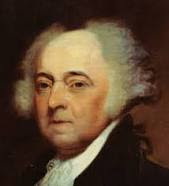John Adams and his son John Quincy engaged each other often in conversations about the political world in which they lived. In John Quincy’s mind no one could write as clearly and with as much power as his father. John believed that his son was the greatest public speaker he had ever heard with the added gift of making friends easily. John Adams wrote: A Defence of the Constitutions of Government of the United States of America against Attack of M. Turgot in His Letter to Dr. Price, Dated the Twenty-Second Day of March, 1778.
 |
| John Adams |
John Quincy: As you explained to Jefferson, much of what you wrote was in response to the dangers of radical French thought. You wrote against the theories of Turgot and in so doing you wanted to poke a finger in Jefferson's eye.
John Adams: Turgot believed in perfect democracy and a single legislature, or as he wrote, "collecting all authority into one center, that of the nation." This belief was nonsense. "A simple, perfect democracy has never existed." I knew my opinions would offend the French but I did not care.
John Quincy: You had achieved little diplomatically in London and you told us that the prospects were dismal. Within weeks after the first copies of your Defence were ready at the printer, you wrote to John Jay to ask that you be recalled. So while noble in intent, the Defence may also have been partly intended as a guide to Americans and to influence the debate on the Constitution.
 |
| John Quincy Adams |
John Adams: It is ridiculous to think that the people were incapable of deciding certain matters on their own, even on the small scale of a village. "I’ve had enough experience with town meetings at home to know that in order for anything to be done certain powers and responsibilities had to be delegated to a moderator, a town clerk, a constable, and, at times, to special committees. This was the pure response of federalism."
John Quincy: You mean delegating decisions on a local matter but retaining central power in the federal government for other matters.
John Adams: Naturally your history books will not have covered the term “Federalist” because it came into use during my generation. "The term refers to a movement to create a strong central government to ward off interpretations of the Articles of Confederation to assure those liberal factions no way forward to weaken the new nation." I was called a Federalist although I was not as ardent a follower as some.
John Quincy: That much I know but the lines seem blurred. I view your politics not as pronounced as those of President Washington but as his Vice President, you upheld all his initiatives.
John Adams: Not all but most. We must not forget that as second in command, I had to support the Commander-in-Chief or be accused of undermining his efforts. Alexander Hamilton, the Secretary of Treasury had Washington’s ear much more than I. He held the purse and gave the President his ideas on spending the appropriated money.
John Quincy: I’ve heard that Hamilton, John Jay and Washington were the only real federalists during the first administration.
John Adams: Hamilton created The Federalist, at first a series of eighty-five newspaper essays, many written with John Jay. Its purpose was to get pro-federalist delegates elected to New York’s ratification convention. My unofficial opinion is that the extreme right of this movement was made up of people who were loyalists and preferred to remain under the rule of Great Britain.
John Quincy: What is your official opinion?
John Adams: My official opinion is that the Federalists wanted a strong central control and the Republicans wanted states to control themselves.
John Quincy: Some have said that George Washington was more like an English Lord than an American patriot. They insist that his mannerisms and way of life are at odds with those of his soldiers and fellow Americans. I have also heard that he fought against the British because he enjoyed combat not because of any deep felt convictions.
John Adams: To my way of thinking, nothing had changed about human nature since the time of the ancients. Inequities within society were inevitable, no matter the political order. Human beings were capable of great good, but also great evil. Thus it had always been and thus it would ever be. I quoted Rousseau's description of "that hideous sight, the human heart," and recounted that even Dr. Priestley had said that such were the weaknesses and folly of men, "their love of domination, selfishness, and depravity," that none could be elevated above others without risk of danger. Opposing political parties often throw whatever dirt comes to their minds. However, I know of no republican who shares those vicious lies about President Washington. Your grandfather, John Quincy felt that I was too liberal to be a federalist. He and your grandmother didn’t approve of me as a suitor of your mother.
John Quincy: Well, I, for one, am exceedingly happy that your persistence won the day.
No comments:
Post a Comment